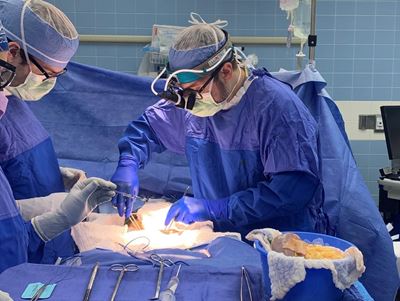As everyday Americans are being told to don their facemasks and practice social distancing, medical professionals are going into hospitals, risking their health and possibly their lives, to fight the ongoing pandemic. For Andrew J. Lutz, MD an assistant professor of surgery, at Indiana University School of Medicine was surprised when he found out he had contracted the coronavirus.
“I was actually going on a donor procurement with three or four other people out of the city sometime in late March, and we usually fly if it's over a couple of hours away,” said Lutz. “No one on the flight showed any symptoms at that time, but on Monday morning I was told that one of the individuals had started to show symptoms and I was asked to go get tested.”
A few days later, Lutz received his test result—he was COVID-19 positive. After his diagnosis, Lutz self-quarantined at his home, having to stay away from both his wife and children. Luckily, his symptoms where mild and he did not require hospitalization.
“I started to feel a few symptoms a couple of days after my test came back positive,” said Lutz. “I had a mild cough, felt tired, had headaches and nausea but, it was always pretty mild.”
As a transplant surgeon, it was important for Lutz to return to work as safely as possible. After his two weeks of quarantine, his team followed the Center for Disease Control guidelines for returning to work safely. Because Lutz works with patients who are at high risk, the team took additional measures to make sure he could return in a safe manner.

“Initially the CDC guidelines were 72 hours with no fevers and then you're safe to be out of quarantine,” said Lutz. “My situation was a little bit different since I work with immune-suppressed patients, so we took extra precautions. I stayed out of work for an extra week then came back.”
After going through this ordeal Lutz felt that he had to use the opportunity to do something. Lutz was told by his wife that he could give plasma to help those struggling from COVID-19.
“My wife had seen something about it in a news article and I thought it was a good idea,” said Lutz. “I want to help patients in any way I can, and at least something good can come out of this experience of getting the virus by being able to help patients.”
When Lutz was eligible for convalescent plasma donation, he became a donor. According to IU Health, more than 800 people who have recovered from the coronavirus and have been screened by IU Health for plasma donation. More than 350 have been identified as candidates for donation and referred to the Versiti Indiana Blood Center.
If you tested positive for COVID-19 and have now recovered, your blood may contain antibodies that are able to fight and control the virus and can help critically ill people currently fighting COVID-19. IU Health is working with blood centers to identify eligible plasma donors. If you are interested please visit the IU health COVID-19 Recovered Plasma Donation.
